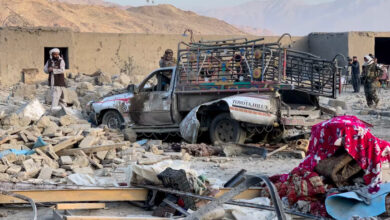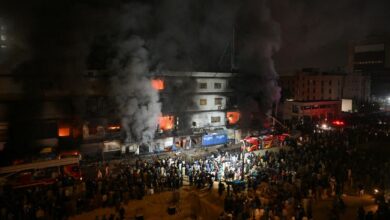Pakistani police took former President Pervez Musharraf into custody on Friday to face allegations he overstepped his powers while in office, marking a dramatic break with a political culture in which military rulers have remained untouchable.
The one-time army chief had hoped to rekindle a degree of influence by standing at general elections in May, but has instead become ensnared in a showdown with judges who fought bruising battles with him while he was still in office.
"He's been shifted to a police guest house for two days of remand," Mohammad Amjad, Musharraf's spokesperson, told Reuters.
A magistrate had raised the stakes earlier on Friday when he ordered Musharraf be placed under house arrest for two days before he is due to appear in court on allegations of illegally detaining judges during a crackdown on the judiciary in 2007.
Musharraf is accused of violating the constitution by placing judges under house arrest after he sacked the chief justice and imposed emergency rule.
Judges had signaled their intent to take a tough line with Musharraf on Friday when they ordered his case be heard in an anti-terrorism court on the grounds that detaining judges could be considered an attack on the state.
Police later transferred Musharraf into custody at a guest house at their headquarters in Islamabad after a senior officer failed to issue paperwork necessary for him to remain under detention at his home, his spokesman, Amjad, said.
Pakistan television broadcast footage of Musharraf leaving his farmhouse residence at an exclusive estate on the edge of Islamabad in a black SUV escorted by police vehicles.
The spectacle of a man who once embodied the army's control over Pakistan being forced to answer to judges was a potent symbol of the way power dynamics have shifted in Pakistan, which has been ruled by the military for more than half its history.
First transition between civilian governments
The 11 May general elections will be the first transition between elected civilian-led governments.
One of Musharraf's lawyers said he would file a petition to overturn the arrest order at the Supreme Court later on Friday.
Musharraf, who seized power in a coup in 1999 and resigned in 2008, returned to Pakistan after almost four years of self-imposed exile in London and Dubai last month to stand for the National Assembly but he was disqualified by election officials.
While the sight of a former army commander being arrested is sure to rankle some in the military, who see the armed forces as the only reliable guarantor of Pakistan's stability, Musharraf's ill-starred return has bemused some former comrades.
"I don't think the army was in favor of him returning and tried to dissuade him," said General Hamid Khan, a former senior army commander. "But he decided to come, and now he has to face this. The army is staying out of it."
However, the order to place Musharraf under house arrest was surprising in a nation where the army still largely controls security policy and where support for the armed forces is equated with patriotism.
He faces a raft of other legal challenges, including allegations that he failed to provide adequate security to prevent the assassination of former Prime Minister Benazir Bhutto in 2007. He has also been accused of treason for his decision to suspend the constitution and impose emergency rule.




